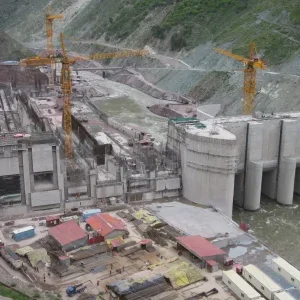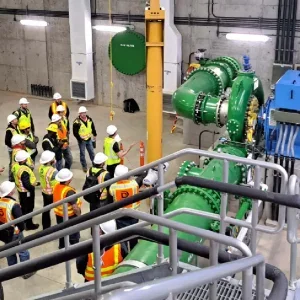
Integrating the sustainability goals of the European Green Deal into its coronavirus recovery plans could set the EU for long-term economic strength, according to analysts.
As governments rush to respond to the growing health emergency with a series of healthcare and economic stimulus plans, there have been concerns that policy action to confront climate change could become sidelined as the pandemic takes immediate precedence.
But following a meeting last week, European Council leaders issued a statement recommending that the “green transition” be put at the heart of any recovery plan.
It said: “The urgency is presently on fighting the coronavirus pandemic and its immediate consequences.
“We should, however, start to prepare the measures necessary to get back to a normal functioning of our societies and economies and to sustainable growth, integrating inter alia the green transition and the digital transformation, and drawing all lessons from the crisis.”
Goals of European Green Deal could revitalise global renewables progress as coronavirus recovery takes shape
In December last year, EU policymakers unveiled the European Green Deal low-carbon transition plan – a roadmap setting out a range of climate targets and sweeping economic reforms designed to help the trading bloc reach net-zero emissions by 2050.
GlobalData analyst Ella Benson Easton said the latest response of council members could prove crucial for the EU’s long-term financial prospects, giving it an advantage over regions where “the speed of recovery is of greater importance than sustainability”.
She added: “The continued commitment of the EU to green principles could prove vital for the recovery of the renewables industry worldwide.
“China leads global solar module manufacturing, but factory closures have resulted in supply chain disruptions worldwide. GlobalData expects the Covid-19 outbreak to contract annual solar installed capacity in China by roughly 17% of pre-pandemic estimates.
“Support for local renewable companies from the EU could be a lifeline for the recovery of the sector worldwide.”
COP26 postponement will not slow Europe’s climate planning
In a further affirmation of the region’s commitment to the Green Deal, European Commission vice president Frans Timmermans said last week that while the postponement of the COP26 climate summit “makes sense”, it would not deter Europe’s environmental policy activity.
He added: “We will not slow down our work domestically or internationally to prepare for an ambitious COP26, when it takes place.
“We have put in place the key EU laws to meet our existing 2030 climate and energy targets. In the long term, we have committed to climate neutrality by 2050 and proposed a climate law that will make this objective legally binding.
“The legislative work on this proposal has started, even in these challenging circumstances.
“We will continue to work intensively through all available channels with our partners around the world to share our plans and to encourage them to raise ambition too, and to work together on other key elements of the global climate agenda, like sustainable finance and adaptation and resilience to the impacts of climate change.”
IEA wants to see clean energy commitments at heart of government relief strategies
Earlier this month, the International Energy Agency (IEA) released a statement calling on governments to put the energy transition front and centre in their coronavirus stimulus plans.
The organisation’s executive director Dr Fatih Birol said: “We should not allow today’s crisis to compromise our efforts to tackle the world’s inescapable challenge.
“These stimulus packages offer an excellent opportunity to ensure that the essential task of building a secure and sustainable energy future doesn’t get lost amid the flurry of immediate priorities.
“Governments can use the current situation to step up their climate ambitions and launch sustainable stimulus packages focused on clean energy technologies.”
Oil crisis has lowered cost of carbon fuel, but prices will rebound
The unfolding oil crisis, resulting from plunging global fuel demand and a geopolitical stand-off between major oil-producing countries unwilling to cut production, has sent fossil fuel prices falling to their lowest in years as markets become saturated with unwanted hydrocarbon reserves.
These low prices could tempt government recovery measures to build stimulus measures around cheap and abundant carbon fuels, but GlobalData’s Easton believes this is short-term planning.
She added: “Renewable energies had previously overtaken fossil fuels as the most affordable energy source. However, this may be threatened if oil and gas prices remain low.
“Enterprises are unlikely to look to adopting renewable energy during a recession, particularly if the price is no longer competitive.
“Carbon prices will rise again. If the EU has integrated the Green Deal and a carbon emission plan into its recovery packages, it is set to be in a stronger long-term position than other regions.
“Rebuilding the economy around green principles will insulate the region from the volatility of fossil fuel prices and encourage sustainable growth.”






